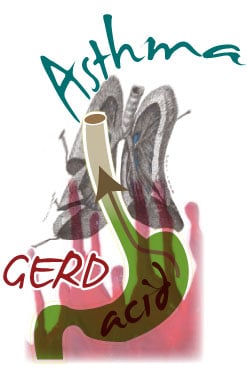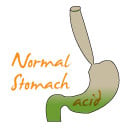 At first glance, Gastroesophageal Reflux Disease (GERD), doesn’t seem to be related asthma. Yet, according to the Cleveland Clinic, more than 75 percent of asthma patients also experience GERD, and asthmatics are twice as likely to develop GERD.
At first glance, Gastroesophageal Reflux Disease (GERD), doesn’t seem to be related asthma. Yet, according to the Cleveland Clinic, more than 75 percent of asthma patients also experience GERD, and asthmatics are twice as likely to develop GERD.
What is Gastroesophageal Reflux Disease (GERD)?
 Also known as acid reflux disease, GERD occurs when stomach acid goes back up into the esophagus. The acid causes a burning sensation known as heartburn. If left untreated, GERD can cause lung damage, esophageal ulcers, and possibly even esophageal cancer. GERD may have many causes, including an abnormal lower esophageal sphincter muscle or a hiatal hernia.
Also known as acid reflux disease, GERD occurs when stomach acid goes back up into the esophagus. The acid causes a burning sensation known as heartburn. If left untreated, GERD can cause lung damage, esophageal ulcers, and possibly even esophageal cancer. GERD may have many causes, including an abnormal lower esophageal sphincter muscle or a hiatal hernia.
Asthma & GERD
GERD may actually cause asthma in certain situations; if the asthma begins in adulthood, if asthma symptoms get worse after meals, or if asthma doesn’t respond to standard treatments, there’s a chance that the asthma is caused by GERD. The exact connection between asthma and GERD is not clear, but many experts think that the acid injures the lining of the airways, making breathing more difficult. Gastric acid may also trigger a nerve reflex in the airways, causing them to tighten. Stimulation of the airway nerves may cause coughing as well.
Barrett’s Esophagus
Only 10% of people with GERD have Barrett’s esophagus, which is a pre-cancerous condition in which the cells of the esophagus have suffered extreme damage. If you have frequent, severe heartburn, you should see a doctor for an evaluation. Most cases of Barrett’s esophagus do not develop into cancer, but periodic endoscopic screenings are recommended. New laser techniques can destroy the pre-cancerous cells if they are caught in time.
If you have Asthma and GERD…

- Take your prescribed medications.
- Elevate your upper body while sleeping. Many people with GERD prefer adjustable beds.
- Avoid eating in the final three or four hours before bedtime.
- Eat small meals.
- Maintain a healthy weight.
- Drink more water.
- Chew gum to stimulate production of saliva, which neutralizes stomach acid in the esophagus.
- Avoid acidic foods like citrus juices that may further irritate the esophagus.
- Limit consumption of fatty foods, chocolate, peppermint, coffee, tea, soft drinks, and alcohol; all of these foods relax the lower esophageal muscle, which normally keeps stomach acid from getting into the esophagus.
- If you smoke, quit smoking. Smoking relaxes the lower esophageal muscle, too.
Originally published in the September 2007 issue of Allergy Consumer Report.
